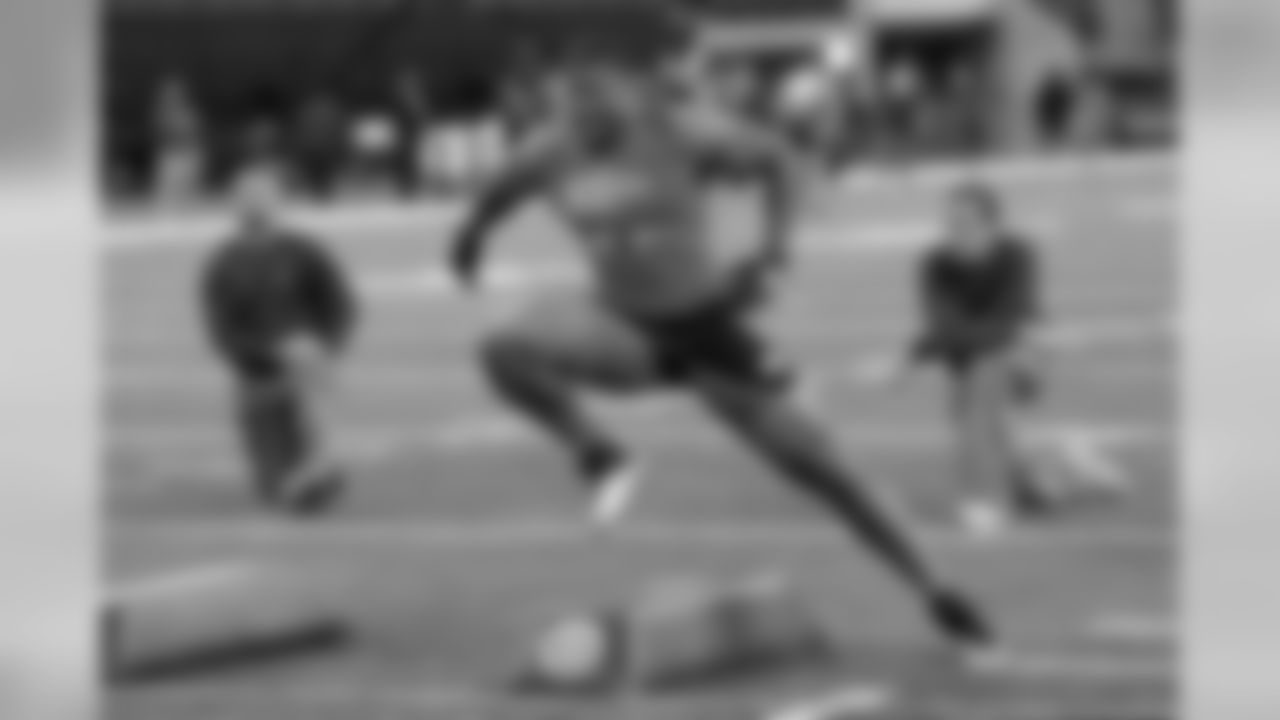INDIANAPOLIS – Consider the 2016 season underway.
That's the general feeling when the NFL Scouting Combine kicks off in Indianapolis, where the focus for teams turns forward to the draft and upcoming phase of roster building.
Roughly half of the league's head coaches and general managers were brought to a podium inside Lucas Oil Stadium on Wednesday, touching on a number of topics.
Here are five key takeaways from those media sessions:
*
- The NFC champion Panthers expect to be more explosive on offense, and they aren't letting CB Josh Norman get to free agency.*
Carolina GM Dave Gettleman confessed his worst fear last year was losing WR Kelvin Benjamin to injury, and then that's exactly what happened. The Panthers obviously compensated for his loss, and with Benjamin's expected return from knee reconstruction and the continued development of WR Devin Funchess, QB Cam Newton could be piloting an even more explosive offense in 2016.
"It's an exciting thing to imagine," Gettleman said, adding that Benjamin will be ready for training camp. "It's fun to think about."
As for star CB Norman, the Panthers are working on a new long-term contract and appear prepared to use the franchise tag to keep Norman if a deal can't be worked out prior to the deadline.
"I don't believe in drafting and developing players for other teams," Gettleman said.
2. The Super Bowl champion Broncos' QB situation remains in flux.
Denver coach Gary Kubiak said there's been no decision from QB Peyton Manning on his future, while fellow Broncos QB Brock Osweiler is a pending free agent, but Kubiak isn't concerned at this point about the uncertainty.
"We want him to take his time and we'll go from there," Kubiak said regarding Manning's potential retirement.
"(Osweiler) has a bright future and we think the world of him. We want him to be part of our football team."
3. New Giants head coach Ben McAdoo has seen different ways to be successful.
McAdoo, a former position coach under Green Bay's Mike McCarthy and offensive coordinator under New York's Tom Coughlin, has worked for two Super Bowl-winning coaches as he ascends to his first top job.
"They give you a blueprint," McAdoo said of McCarthy and Coughlin, who possess different leadership styles. "There's more than one way to skin a cat, and Tom and Mike are great examples of that.
"You take something from every place you've been, mold it and make it your own."
McAdoo worked for McCarthy for eight years, six as tight ends coach (2006-11) and two as QB coach (2012-13) before moving on with the Giants the past two seasons. He considers Green Bay a "special place" but admitted he hasn't given much thought to what it'll be like next season to re-enter Lambeau Field as the opposing coach across from McCarthy. The Packers will host the Giants in 2016, making McAdoo the second head coach from the McCarthy tree to coach against Green Bay (Joe Philbin of the Dolphins was the first).
"I look forward to getting back there," McAdoo said. "I know they've got a pretty good football team. They usually do. It'll be good to see some familiar faces."
*
View photos of Packers players taking part in the NFL Scouting Combine throughout the years. Photos by AP Images.

Jeff Janis

Aaron Rodgers

Clay Matthews

Jordy Nelson

Randall Cobb

Sam Barrington

Quinten Rollins

Letroy Guion

B.J. Raji

Bryan Bulaga

Mike Neal

Scott Tolzien

Nick Perry

Casey Hayward

Datone Jones

David Bakhtiari

Ty Montgomery

Ha Ha Clinton-Dix

Jake Ryan

Richard Rodgers

Davante Adams

James Jones

Brett Hundley

John Crockett

Jared Abbrederis

Corey Linsley
- Expansion of instant replay will continue to be discussed.*
Whether it's having more replay reviews initiated from the booth, as is the case in the college game, or adding judgment calls (such as pass interference) to the list of reviewable plays, the evolution of the NFL's instant replay system doesn't appear to be over.
"One of the hardest things for coaches is knowing what's reviewable and what isn't," said new Tampa Bay head coach Dirk Koetter, referring to that burden being removed from college coaches for the most part. "We have the technology to get it right."
With the league's officials coming under increasing scrutiny and officiating controversies dominating post-game analysis at times, the status quo with the current challenge system and limitations on reviewable plays may not remain so for much longer. The process for change is more extensive than a few coaches voicing their opinions, however.
"Whatever gets it right," Kubiak said. "Whatever we can do to get as close to right on gameday as we can without slowing the game down, slowing the pace down, I think we're all in favor of that."
5. It's getting harder to find NFL-ready tight ends and offensive linemen.
The increased proliferation of spread offenses in the college game has led to more draft picks at tight end and on the offensive line becoming developmental prospects rather than immediate impact players.
"Especially in the run game, because they weren't asked to do it as much," San Francisco GM Trent Baalke said of blocking skills. "The college game is so different from the game we play, especially at the line of scrimmage."
Several coaches said a lot of offensive linemen come out of college with little experience in a three-point stance. As for young tight ends, they're often either in-line blockers or flanked-out pass-catchers, but rarely both.
"We're not getting instant oatmeal anymore," Gettleman said.
With Green Bay's offense needing a big-play threat at tight end, how much a rookie at that position will be able to help with the ground game becomes a valid question.
"Guys who can do it all generally don't exist anymore," Arizona GM Steve Keim said. "You'll think guys are functional in the run game, but you put on the tape and they're really not. You see guys at the point of attack have a very difficult time."















